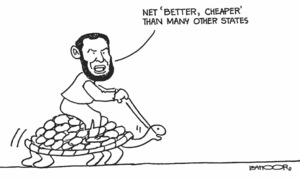WHEN home feels like a sinking ship, people are forced to make ill-fated journeys for a better life. Last month, numerous Pakistanis died in yet another Greek boat tragedy. According to the US State Department’s 2024 Trafficking in Persons Report, the Pakistani authorities fell far short of meeting minimum criteria in several important areas. For a country viewed as a human trafficking hub, the absence of an official database of victims and trafficking rings, coupled with the inability to ensure efficient investigation, expedient prosecution and conviction of traffickers, is not only alarming, it also fuels unbridled exploitation. In this bleak scenario, Prime Minister Shehbaz Sharif’s orders to take severe legal action against the human trafficking mafia, including the confiscation of their assets, are encouraging. But as necessary as it is to clamp down on trafficking networks who prey on poverty and desperation, it is equally crucial to reflect on the circumstances that compel citizens to risk their lives.
The vast and multilayered crime of human trafficking requires a wider, pre-emptive and result-driven strategy from the government. Battling complicit officials and powerful interests tops the list of major challenges — an insurmountable reality without unrelenting political commitment. Moreover, as influential perpetrators get away with the imposition of fines instead of incarceration, the on-ground enforcement of the Prevention of Trafficking in Persons Act 2018 remains insignificant, rendering it ineffective as a deterrent. Eradicating human trafficking is one of the UN’s Sustainable Development Goals for 2030. But estimates show that traffickers dupe thousands of Pakistanis every year due to acute poverty, lack of education, unemployment and violence. Hence, the prime minister’s call for technical training is a long shot because urgent financial support is any household’s priority. Besides, eliminating human traffickers begins with a toughened legal system and a security apparatus empowered enough to withstand political pressure. An invisible side of the odious practice is the growing web of digital trafficking — in 2023, reportedly, online syndicates made up to $37bn from targets across East and Southeast Asia. A UN report in October revealed that online gangs use AI as a weapon of deception. Pakistan’s anti-trafficking measures depend on the speed with which its fractured digital space is restored so that digital slavery rackets, and fraudulent charity enterprises, are successfully thwarted. In short, we must fight fire with fire.
Published in Dawn, January 13th, 2025













































Dear visitor, the comments section is undergoing an overhaul and will return soon.